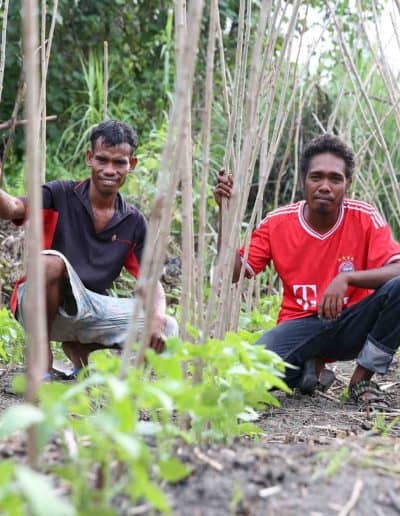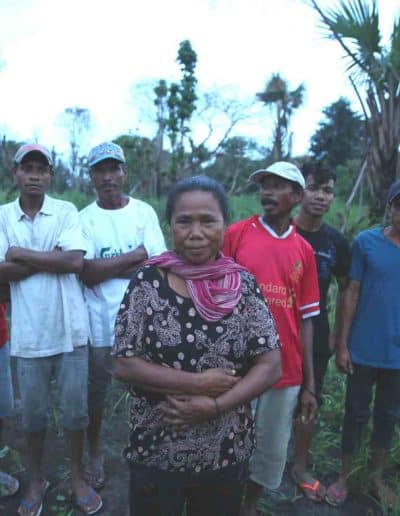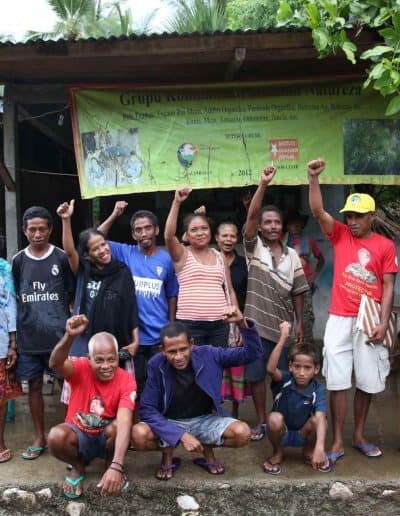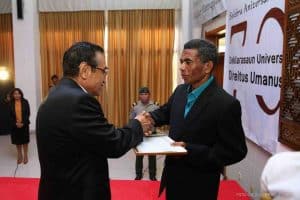Strengthening and Supporting Rural Farmers Organisations in Timor Leste
The majority of the Timor Leste population live and work in rural farming districts. Small-scale family agriculture is the basis of the national economy however agricultural production is low and farmers’ income is often insecure. Local food and cash crop production do not meet national or export demands.
An organised agricultural sector will make a fundamental and sustainable contribution to the economy and significantly reduce poverty across farming communities. Local development of the farming sector could provide future sustainable alternatives to the the high dependence on finite oil and gas resources in the Timor Sea.
APHEDA partners currently work across nine districts with over 1,200 direct beneficiaries. Field organisers live alongside the farmers to support them to develop strong and democratic farmer bases which are able to organise rural communities, mobilise existing resources and facilitate access to capital, credit, land and seeds for agricultural production.
A growing movement: farmers come together in unions
APHEDA’s three Agricultural partners Institutu Edukasaun Popular (IEP), Kdadalak Sulimutuk Institute (KSI) and Union Agrikultura de Ermera (UNAER), have continued to achieve incredible organising, educational and community movement-building results over the past year.
A second Agricultural Farmers’ Union was established in the District of Liquica and a third farmers’ union is in its final phase in the District of Suai. The Suai farmers’ union will incorporate 50 community bases including those developed by other agricultural NGO’s working in this area.
The establishment of district farmers’ unions with community elected leadership provides both a political voice and a democratic process for collective decision making. The Government is already consulting directly with these organisations as elected representatives of the farming community and requesting their involvement in decision making forums.
Agricultural union awarded 2018 Human Rights Award
Respect for the great work of the Agricultural Union in Ermera (UNAER) was recognised on International Human Rights Day in 2018 when UNAER’s president Maun Alberto Guterres Martins was awarded Timor Leste’s Annual Human Rights award in a public ceremony held in Dili.
The long term goal is for a National Agricultural Union to be established, consolidating the important role local community based leaders play in determining their own futures and providing a powerful instrument to influence political decision making for Timor’s rural population.
Throughout Timor Leste, APHEDA partner organisations have established a total of 66 Community Bases since the beginning of this project, across nine districts. Once a new group has been established, the field organisers work closely with farmers, living in the community, listening and delivering training on organic, traditional and integrated farming techniques and advocacy.
Field organisers spend three weeks per month in the community and one week in Dili to consolidate their organisations’ national strategy. This model allows them to develop a deep understanding of each community base,their specific challenges and offer direct support including the faciiltation of collective decision making. Farmers are trained in effective utilisation of local resources including land and seeds that can be managed as a source of economic income for farmers and rural communities.
Mutual support for economic development
This project also supports the development of economic cooperatives supporting farmer groups to manage their profits in a way that is collective, independent, and sustainable and ensures the availability of food products to meet the needs of each farming family and family member.
To support this goal, field organisers and trainers from all three partners are working together with community bases on workshops to assist them to build distribution networks and markets for their crops. A three day workshop attended by 42 farmers from across the region was held in Hanare, Uatucabau in October 2018.
Distribution networks are currently being established by farmers in the districts of Bacau, Liquica, Ermera and Suai and the community of Tilobar has established a micro-credit co-operative to support local farmers.
Skills for farming and leadership
One of the key objectives has been to increase access to training for farmers at the district and farm base level. The training has included organic farming techniques, integrated farming, nursery development, advocacy, land reform and distribution networks.
Regional agricultural training centres have been established in Marboro, Uatucabau and Failebo and KSI has a well-established training centre in Betano. APHEDA partners often choose to deliver cross-community training on the farm bases themselves to demonstrate successful techniques and crops in the field through peer-to-peer delivery.
UNAER has the IEFS (Institutu Ekonomia Fulidadai-Slulu) Training Centre in Ermera which delivers 6-month concentrated leadership, activism and advocacy training for young farmers. The training is modelled on Paolo Freire’s popular education techniques and includes political as well as practical, skills-based education. Farmers work intensively to develop sustainable agriculture and community leadership and advocacy skills. It is anticipated that IEFS alumni will transfer this knowledge to the communities and step up into leadership roles locally.
Farmers caring for the land
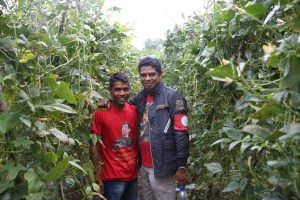 Another key feature is environmental sustainability. In a sharp contrast to some of the decisions and large-scale projects financed by INGOs in the past, the focus of APHEDA partners is to move away from chemical-based pesticides and fertilisers or GMO-based crops.
Another key feature is environmental sustainability. In a sharp contrast to some of the decisions and large-scale projects financed by INGOs in the past, the focus of APHEDA partners is to move away from chemical-based pesticides and fertilisers or GMO-based crops.
Instead, APHEDA partners are developing community nurseries using organic farming techniques to not only produce crops for food and market but also grow and distribute plants that will protect the soil from erosion and maintain seed protection. The integrated farming training incorporates reforestation projects and traditional farming techniques that focus on environmental protections.
Building on success in 2020
APHEDA partners will continue to deliver training and assist farmers to establish additional economic cooperatives in the districts. In addition they are working on establishing more local education and resource centres, bringing in community expertise and consolidating relationships with other NGOs and organisations working in the regions.
This consolidation of relationships and agreements with other civil society organisations is a fundamental aspect of the partners’ commitment to establish farmers unions in multiple districts, eventually leading to the creation of a National Farmers’ Union and Congress.
Become a Global Justice Partner today and contribute to Union Aid Abroad – APHEDA’s work in Timor Leste and our other projects. Yes, sign me up!
Read more about empowering farmers in Timor Leste:
Sustainable farming and organising in Timor Leste
APHEDA Timor Leste Office hosts visit from Australian MP and Ambassador
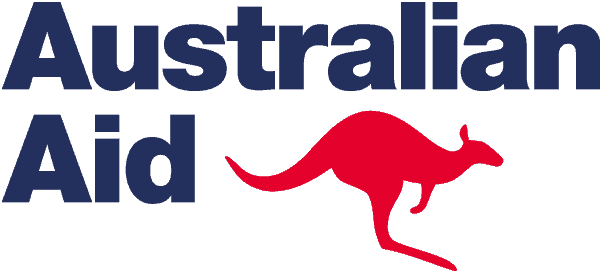 UNAER’s ‘Empower UNAER’s Farmers Towards Sustainable Farming in Timor Leste’ is supported by the Australian Government through the Australian NGO Cooperation Program (ANCP).
UNAER’s ‘Empower UNAER’s Farmers Towards Sustainable Farming in Timor Leste’ is supported by the Australian Government through the Australian NGO Cooperation Program (ANCP).
